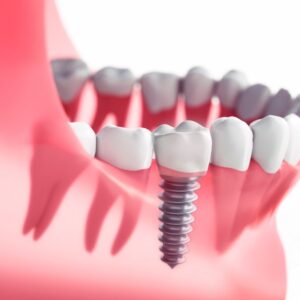
Understanding Dental Implant Surgery
Dental implant surgery entails the placement of synthetic tooth roots, known as implants, into the jawbone to provide support for dental prostheses like crowns, bridges, or dentures. The surgery is commonly conducted with the use of local anesthesia, ensuring a painless experience for the patient. Following the surgery, the implants necessitate a healing period in which they integrate with the jawbone, establishing a sturdy foundation for the replacement teeth.
Preparing for Recovery
Before undergoing dental implant surgery, it is essential to prepare for the recovery process. Follow these guidelines:
Communicate with your dentist
Discuss your medical history, any medications you are taking, and any concerns you may have with your dentist. This information will help them create a personalized plan for your surgery and recovery.
Arrange for assistance
Plan for someone to accompany you to the surgery and drive you home afterward. Having a support system during the initial recovery phase is beneficial.
Create a comfortable recovery space
Prepare a recovery space at home with extra pillows, blankets, and entertainment options to keep you comfortable during the healing process.
Managing Post-Surgery Discomfort
After dental implant surgery, it is common to experience some discomfort. Here’s how you can manage it effectively:
Take prescribed medications
Your dentist may recommend pain medications or antibiotics to prevent infection. Follow the instructions carefully and take the medications as prescribed.
Apply ice packs
Applying ice packs to the area can assist in reducing swelling and alleviate discomfort. Use them for short intervals, around 15 minutes at a time.
Avoid physical exertion
Refrain from strenuous activities for the first few days after surgery. Resting and allowing your body to heal is crucial for a smooth recovery.
Practicing Good Oral Hygiene
Maintaining proper oral hygiene is essential during the recovery process. Follow these guidelines:
Gently brush your teeth
Make use of a toothbrush with soft bristles to gently clean your teeth and implants. Be cautious around the surgical site to avoid any potential damage.
Rinse with a saltwater solution
Rinsing with a warm saltwater solution can reduce inflammation and promote healing. Prepare the solution by dissolving half a teaspoon of salt in eight ounces of warm water.
Following a Soft Diet
To protect the surgical site and aid in healing, stick to a soft diet during the initial recovery phase. Consider the following:
Choose soft foods
Opt for soft foods that require minimal chewing, such as mashed potatoes, yogurt, soups, smoothies, and steamed vegetables. Refrain from consuming hard, crunchy, or sticky foods that may cause irritation to the surgical site.
Stay hydrated
Drink plenty of fluids to stay hydrated. It is advisable to refrain from using straws, as the sucking motion can interfere with the healing process.
Avoiding Certain Habits
To ensure a smooth healing process, it is crucial to avoid certain habits that can interfere with the recovery:
Quit smoking
Smoking impedes the healing process and raises the likelihood of implant failure. If you smoke, quitting before and after dental implant surgery is strongly advised.
Limit alcohol consumption
Alcohol can impair the body’s natural healing ability and negatively affect medications. It is advisable to abstain from alcohol during the recovery period.
Attending Follow-up Appointments
Regular follow-up appointments with your dentist are vital for monitoring the healing progress and addressing concerns. Make sure to attend all scheduled appointments.
Maintaining a Healthy Lifestyle
Adopting a healthy lifestyle can promote a smooth healing process and improve oral health. Consider the following:
Practice stress management
Stress can negatively impact the healing process. Engage in activities such as meditation, yoga, or hobbies that help you relax and manage stress effectively.
Potential Complications and When to Seek Help
While dental implant surgery is generally safe, complications can arise. Contact your dentist immediately if you experience the following:
- Excessive bleeding
- Severe pain or swelling
- Prolonged numbness or tingling
- Implant or prosthesis-related issues
Returning to Normal Activities
As the healing progresses, you can gradually return to normal activities. However, consult your dentist before engaging in physically demanding or contact sports.
Conclusion
Recovering from dental implant surgery is crucial in achieving a successful outcome. By adhering to the suggestions provided in this article, you can ensure a seamless healing process and enhance the longevity of your dental implants. Remember to consult your dentist for personalized advice and guidance throughout recovery.
